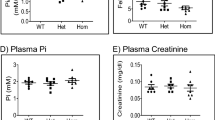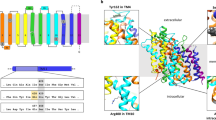Abstract
Maintenance of fluid and electrolyte homeostasis is critical for normal neuromuscular function. Bartter's syndrome is an autosomal recessive disease characterized by diverse abnormalities in electrolyte homeostasis including hypokalaemic metabolic alkalosis; Gitelman's syndrome represents the predominant subset of Bartter's patients having hypomagnesemia and hypocalciuria. We now demonstrate complete linkage of Gitelman's syndrome to the locus encoding the renal thiazide-sensitive Na–Cl cotransporter, and identify a wide variety of non-conservative mutations, consistent with loss of function alleles, in affected subjects. These findings demonstrate the molecular basis of Gitelman's syndrome. We speculate that these mutant alleles lead to reduced sodium chloride reabsorption in the more common heterozygotes, potentially protecting against development of hypertension.
This is a preview of subscription content, access via your institution
Access options
Subscribe to this journal
Receive 12 print issues and online access
$209.00 per year
only $17.42 per issue
Buy this article
- Purchase on Springer Link
- Instant access to full article PDF
Prices may be subject to local taxes which are calculated during checkout
Similar content being viewed by others
References
Lifton, R.R. Genetic determinants of human hypertension. Proc. Natl. Acad. Sci. USA. 92, 8545–8551 (1995).
Bartter, F.C., Pronove, P., Gill, J.R. & MacCardle, R.C. Hyperplasia of the juxtaglomerular complex with hyperaldosteronism and hypokalemic alkalosis. Am. J. Med. 33, 811–828 (1962).
Goodman, A.D., Vagnucci, A.M. & Hartroft, P.M. Pathogenesis of Bartter's syndrome. N. Eng. J. Med. 281, 1435–1439 (1969).
Dunn, M.J. Prostaglandins and Bartter's syndrome. Kid. Int. 19, 86–102 (1981).
Imai, M. et al. A case of Bartter's syndrome with abnormal renin response to salt load. J. Fed. 74, 738–749 (1969).
Graham, R.M., Bloch, K.D., Delaney, V.B., Bourke, E. & Seidman, J.G. Bartter's syndrome and the atrial natriuretic factor gene. Hypertension. 8, 549–551 (1986).
Rodrigues Pereira, R. & Van Wersch, J. Inheritance of Bartter's syndrome. Am. J. Med. Gen. 15, 79–84 (1983).
Silverberg, A.B., Mennes, P.A. & Cryer, R.E. Resistance to endogenous norepinephrine in Bartter's syndrome. Reversion during indomethacin administration. Am. J. Med. 64, 231–235 (1978).
Bettinelli, A. et al. Use of calcium excretion values to distinguish two forms of primary renal tubular hypokalemic alkalosis: Bartter and Gitelman syndromes. J. Pediatr. 120, 38–43 (1992).
Iwata, R, Hanawa, Y. & Takashima, H. Chronic hypomagnesemia and hypokalemia due to renal wasting in siblings. Acta Paed. Japonica. 35, 252–257 (1993).
Marco-Franco, J.E., Morey, A., Ventura, C., Gascó, J.M. & Alarcon, A. Long-term evolution and growth patterns in a family with Bartter's syndrome. Clin. Neph. 42, 33–37 (1994).
Zarraga Larrondo, S. et al. Familial hypokalemia-hypomagnesemia or Gitelman's syndrome: a further case. Nephron. 62, 340–344 (1992).
Smilde, T.J. et al. Familial hypokalemia/hypomagnesemia and chondrocalcinosis. J. Rheum. 21, 1515–1519 (1994).
Simopoulos, A.R. Growth characteristics in patients with Bartter's syndrome. Nephron. 23, 130–135 (1979).
Okusa, M.D. & Bia, M.J. Bartter's syndrome. In Hormone Resistance and Other Endocrine Paradoxes, (eds. Cohen, R and Foa, P.) 231–263 (Springer Verlag, New York, 1987).
Gitelman, H.J., Graham, J.B. & Welt, L.G. A new familial disorder characterized by hypokalemia and hypomagnesemia. Trans. Assoc. Am. Phys. 79, 221–235 (1996).
Rudin, A., Aurrell, M. & Wilske, J. Low urinary calcium excretion in Bartter's syndrome. Scand. J. Urol. Nephrol. 22, 35–39 (1988).
Clive, D.M. Bartter's syndrome: The unsolved puzzle. Am. J. Kid. Dis. 25, 813–823 (1995).
Yoshida, H. et al. Angiotensin II type 1 receptor gene abnormality in a patient with Bartter's syndrome. Kid. Int. 46, 1505–1509 (1994).
Ellison, D.H. The physiologic basis of diuretic synergism: its role in treating diuretic resistance. Ann. Int. Med. 114, 886–894 (1991).
Gamba, G. et al. Primary structure and functional expression of a cDNA encoding the thiazide-sensitive, electro-neutral sodium-chloride cotransporter. Proc. Natl. Acad. Sci. USA. 90, 2749–2753 (1993).
Gamba, G. et al. Molecular cloning, primary structure, and characterization of two members of the mammalian electroneutral sodium-(potassium)-chloride cotransporter family expressed in the kidney. J. Biol. Chem. 269, 17713–17722 (1994).
Gyapay, G. et al. The 1993-94 Généthon human genetic linkage map. Nature Genet. 7, 246–339 (1994).
Shen, Y.S. et al. A PCR-based genetic linkage map of human chromosome 16. Genomics. 22, 68–76 (1994).
Rudin, A. Bartter's syndrome. A review of 28 patients followed for 10 years. Acta Med. Scand. 224, 165–171 (1988).
Ward, R. Familial aggregation and genetic epidemiology of blood pressure. In Hypertension: Pathophysiology, Diagnosis and Management, (eds Laragh, J.H. & Brenner, B.M.) 81–100 (Raven Press, New York, 1990).
Cushner, H.M., Peller, T.R., Fried, T. & Delea, C.S. Does magnesium play a role in the hypokalemia of Bartter's syndrome? Am. J. Kid. Dis. 16, 495–500 (1990).
Scoble, J.E., Screaton, G.R. & Havard, C.W. Renal magnesium wasting in Bartter's syndrome. Neph. Dial. Transp. 5, 388–390 (1990).
Stahl, M.M.S., Vaara, I., Hedner, P. & Ekman, R. Vasoactive peptides in Bartter's syndrome. Eur. J. Clin. Invest. 23, 80–83 (1993).
Sutton, R.A.L., Mavichak, V., Halabe, A. & Wilkins, G.E. Bartter's syndrome: evidence suggesting a distal tubular defect in a hypocalciuric variant of the syndrome. Miner. Elect. Metab. 18, 43–51 (1992).
Bell, G., Karam, J. & Rutter, W. Polymorphic DNA region adjacent to the 5′ end of the human insulin gene. Proc. Natl. Acad. Sci. USA 78, 5759–5763 (1981).
Obermüller, N. et al.. Expression of the thiazide-sensitive cotransporter in rat and human kidney. Am. J. Physiol. (in the press).
Feinberg, A.R. and Vogelstein, B.A. Techniques for radiolabeling DNA to high specific activity. Ann. Biochem. 132, 6–13 (1983).
Shimkets, R.A. et al. Liddle's syndrome: heritable human hypertension caused by mutations in the beta subunit of the epithelial sodium channel. Cell 79, 407–414 (1994).
Lathrop, G.M., Lalouel, J.M., Julier, C. & Ott, J. Strategies for multilocus linkage analysis in humans. Proc. Natl. Acad. Sci. USA 81, 3443–3446 (1984).
Orita, M., Iwahana, H., Hayashi, K. & Sekiya, T. Detection of polymorphisms of human DNA by gel electrophoresis as single-strand conformation polymorphisms. Proc. Natl. Acad. Sci. USA. 86, 2766–2770 (1989).
Author information
Authors and Affiliations
Rights and permissions
About this article
Cite this article
Simon, D., Nelson-Williams, C., Johnson Bia, M. et al. Gitelman's variant of Barter's syndrome, inherited hypokalaemic alkalosis, is caused by mutations in the thiazide-sensitive Na–Cl cotransporter. Nat Genet 12, 24–30 (1996). https://doi.org/10.1038/ng0196-24
Received:
Accepted:
Issue Date:
DOI: https://doi.org/10.1038/ng0196-24
This article is cited by
-
Genotype–phenotype correlations in children with Gitelman syndrome
Clinical and Experimental Nephrology (2024)
-
A case of pseudo-Bartter/Gitelman syndrome caused by long-term laxative abuse, leading to end-stage kidney disease
CEN Case Reports (2024)
-
Insights into the diverse mechanisms and effects of variant CUL3-induced familial hyperkalemic hypertension
Cell Communication and Signaling (2023)
-
Tophaceous gout in a young man with Gitelman syndrome: a case report with an overview
Clinical Rheumatology (2023)
-
Genotypic variability in patients with clinical diagnosis of Bartter syndrome type 3
Scientific Reports (2023)



